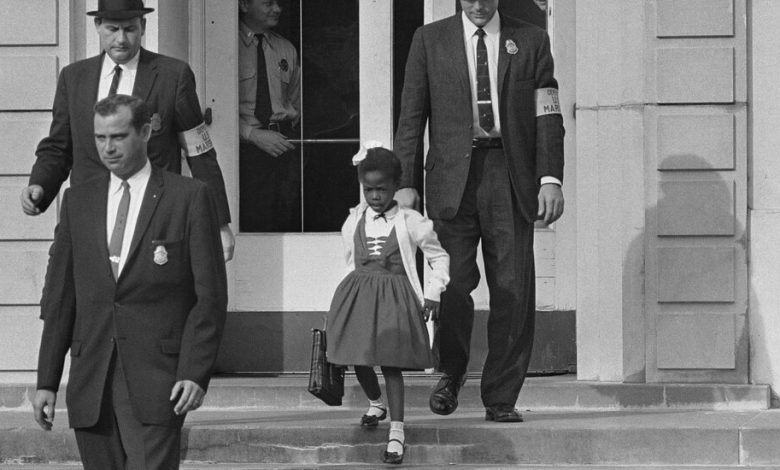A Florida School Banned a Disney Movie About Ruby Bridges. So I Watched It.

This month, an elementary school in St. Petersburg, Fla., stopped showing a 1998 Disney movie about Ruby Bridges, the 6-year-old Black girl who integrated a public elementary school in New Orleans in 1960, because of a complaint lodged by a single parent who said she feared the film might teach children that white people hate Black people.
The school banned the film until it could be reviewed. So I decided to review the film myself.
First, here’s a refresher on Ruby: When she integrated that school, she had to be escorted by federal marshals. She was met by throngs of white racists — adults! — jeering, hurling epithets, spitting at her and threatening her life. Parents withdrew their children.
Only one teacher would teach her, so every day that 6-year-old girl had to be in class by herself, save for the teacher, and eat lunch alone.
Ruby became afraid to eat because one of the protesters threatened to poison her. Her father lost his job, and the local grocery asked that her family not come back to the store.
All of this was endured by a Black first grader, but now a Florida parent worries that it’s too much for second graders to hear, see and learn about.
Furthermore, of all the ways Ruby’s story could have been portrayed, the Disney version is the most generous, including developed story lines for Ruby’s white teacher and the white psychiatrist who treated her. And in the end, another white teacher and a white student come around to some form of acceptance.
The movie is what you’d expect: a lamentable story about a deplorable chapter in our history, earnestly told, with some of the sharpest edges blunted, making it easier for children to absorb.
But in Florida, the point isn’t the protection of children but the deceiving of them. It’s to fight so-called woke indoctrination with a historical whitewash.
And the state has given individual parents extraordinary authority as foot soldiers in this campaign: In this case, a single objecting parent is apparently enough to have a lesson about our very recent history questioned or even banned. Remember: Bridges isn’t some ancient figure in a dusty textbook, she’s alive and well today. She’s 12 years younger than my own mother.
Earlier this year, in the same school district, Toni Morrison’s “The Bluest Eye” was banned from all district high schools because a parent complained about a rape scene in the book.
Also this month, a principal in Florida was pressured to resign after students were shown Michelangelo’s statue of David, a biblical figure no less, and three parents complained.
Giving so few parents so much power to take educational options away from other parents and children runs counter to the spirit of democracy and free inquiry, and enshrines a form of parental tyranny of the hypersensitive, the inexplicably aggrieved and the maliciously oppressive.
It portends an era of bedlam in Florida’s schools, all courtesy of extremist state legislators’ and Gov. Ron DeSantis’s quixotic war on wokeness.
What happens if this glove gets turned inside out and minority parents begin to complain about the teaching of other aspects of American history and culture?
What happens if they reject lessons or books about Thomas Jefferson because he raped a teenage girl he enslaved, Sally Hemings, and was the father of her children, including at least one born while she was a child herself. (For the record, I consider all sex between enslavers and those they enslaved rape, because it was impossible for the enslaved to consent.)
What happens if a parent objects to a school celebrating Columbus Day because Christopher Columbus was a maniacal colonizer who sold young girls as sex slaves?
What happens if parents object to books about and celebrations of Thanksgiving because the standard portrayal of the first Thanksgiving as a meeting among friends who came together to share bounty and overcome difference is a fairy tale?
What if they object to the Bible itself, which includes rape, incest, torture and murder?
History is full of horribleness. We do ourselves and our children no favors pretending otherwise.
Learning about human cruelty is necessarily uncomfortable. It is in that discomfort that our empathy is revealed and our righteousness awakened.
These debates continue to center on the discomfort of white children, but seem to ignore the feelings of Black children, discomfort or otherwise.
As I watched the film, I was incredibly uncomfortable, sometimes angry, sometimes near tears as I revisited Ruby’s story.
How did that happen? How do we honor that moment, condemning the cruelty of the racists and exalting her bravery? And how do we address the effect of racial discrimination on the American experience?
If an accurate depiction of white racism and cruelty is a metric by which educational instruction and materials can be banned, how is a true and full teaching of American history possible?
Maybe distortion is the point. It’s the resurrection of a Lost Cause moment in which a revisionist history is crafted to rehabilitate Southern racists.
The wave of censorship we’re seeing also invokes, for me, the “slave” Bible, an abridged text used in the 1800s in the West Indies to try to pacify the enslaved. Passages that evoked liberation were cut and passages that supported slavery were kept. It was a tool of psychological warfare masquerading as sacred text.
DeSantis’s Florida is engaged in similar psychological warfare. Its battlegrounds are race, gender and sexuality, and it is napalming inclusive narratives.
The state’s crusading censors are choosing the comfort of ignorance over the inconvenience of truth.
The Times is committed to publishing a diversity of letters to the editor. We’d like to hear what you think about this or any of our articles. Here are some tips. And here’s our email: [email protected].
Follow The New York Times Opinion section on Facebook and Twitter (@NYTopinion), and Instagram.
